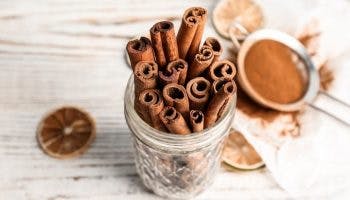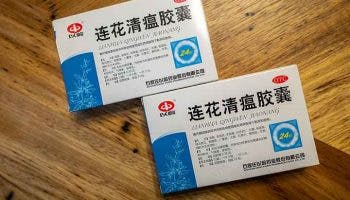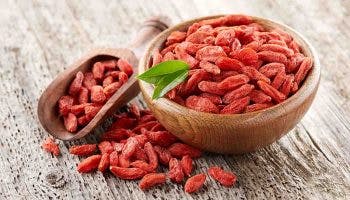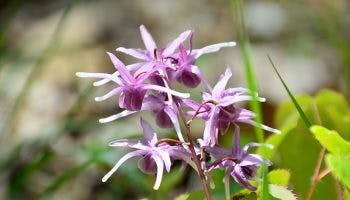Ginkgo Biloba: How This Herb Helps You Live Longer
Published | 5 min read
Ginkgo biloba outlived dinosaurs and inspired poetry. Read on to learn about how this resilient living fossil can help you maintain great health.
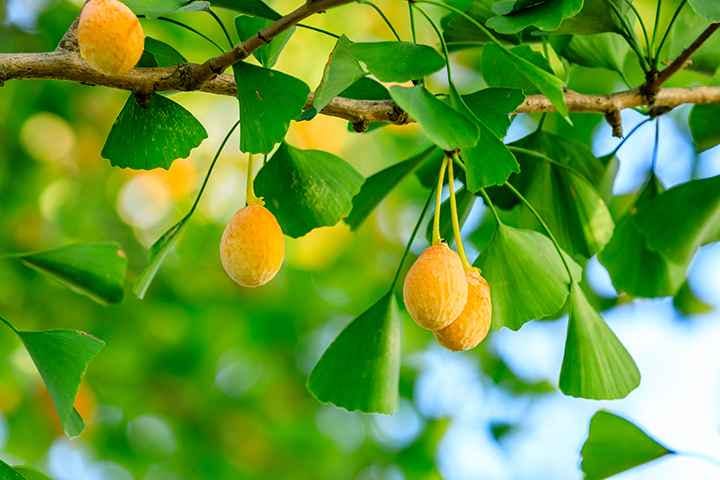
Have you heard about this powerful “memory” herb that comes from a tree with stinky fruits? The Ginkgo biloba tree is also known as the maidenhair tree. It has fascinated humans for a long time with its unique fan-shaped leaves and lustrous yellow foliage in autumn.
Native to China and one of Earth’s oldest living fossils, the Ginkgo biloba tree has remained the same for over 200 million years and is the last surviving species of its lineage. Its kernels and leaves have been used for hundreds of years as herbal medicine to prevent cognitive impairment, cardiovascular disease, and many other ailments.
A Plant-Based Powerhouse: Health Benefits of Ginkgo Biloba

The earliest reference to Ginkgo biloba was in poems written during the Song Dynasty in the 11th century, followed by more references in 13th and 14th century Chinese literature. The Ginkgo biloba tree subsequently found its way to other parts of Asia including Japan, thanks to a Dutch East India Company physician named Engelbert Kaempfe. He became fascinated by the tree and wrote about it in 1712.
The Chinese have been using Ginkgo biloba for many decades for culinary and medicinal purposes. In many Eastern cultures, it is considered a sacred tree. It has numerous health benefits, owing to two primary active compound groups: terpenoids and flavonoids. Today, both manufacturers in the East and West produce herbal supplements that use the standardised extracts of the plant.
An increasing number of meta-analytical and systemic reviews of smaller studies indicate that the herb has therapeutic action on neurodegenerative cognitive diseases, and cardiovascular diseases.
Historically used in the East to treat bronchitis, asthma, and renal dysfunction, Ginkgo biloba has great health benefits for modern-day illnesses.
Neurodegenerative diseases
Research has demonstrated the herb can help prevent or treat ageing-related neurodegenerative conditions such as dementia and Alzheimer’s. It is able to increase blood flow to the brain, help brain cells utilise glucose and oxygen more efficiently.
Cardiovascular diseases
In China, injections containing Ginkgo biloba extract are used to treat heart attacks. Animal studies have also shown that the herb extract has potent protective properties. It inhibits apoptosis (programmed cell death) of heart tissue cells, which is a precursor of heart failure. In addition, there is indication that the herb has a lot of potential in the treatment of strokes by improving blood plasma viscosity.
Cancer
Research on Ginkgo biloba has also shown promising answers in the area of anti-cancer drug development. A 2019 study observed the actions of five active compounds within it against cancer cells. It found that two of them are particularly anti-proliferative.
Complications of diabetes
Animal studies have shown that Ginkgo biloba extract can improve renal (kidney) function. It reduces damage to the tubular structures within the kidney due to diabetic complications. It is also well-known as a prevention and treatment of glaucoma.
Ginkgo Biloba in TCM
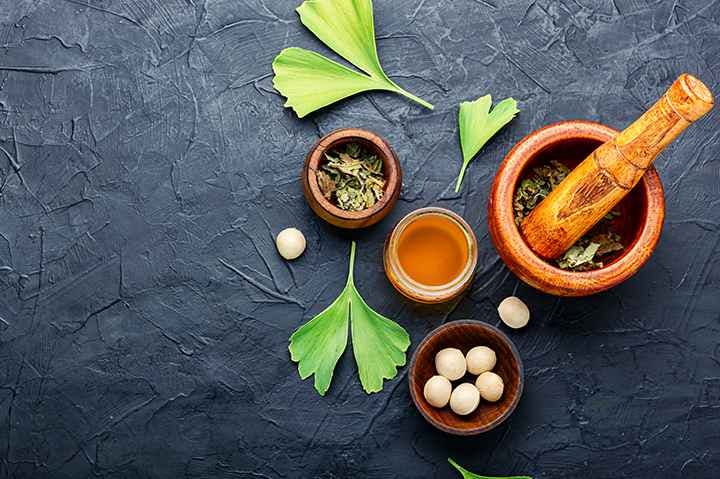
Traditional Chinese Medicine (TCM) is no stranger to the medicinal powers of Ginkgo biloba. Roasted ginkgo seed kernel is a local delicacy in Eastern countries such as China, Korea, and Japan. In fact, paleobotanists who study the herb and its extinct relatives believe that its survival had something to do with the early consumption of its kernels by humans and other animals.
Since TCM is a robust medical philosophy and practice, TCM-based therapy includes Ginkgo biloba leaf extract for numerous ailments.
According to TCM physician Luke Yau Wai, this herb can present as sweet, bitter, and astringent in TCM terminology. It enters the Heart and Lung meridians.
“Ginkgo biloba helps in calming the nerves. It also eliminates Heat and is a diuretic, which helps promote fluid excretion from the body, removing Blood Stasis,” physician Luke states. It regulates qi by dredging collaterals, essentially clearing an obstruction from meridian pathways.
Other ailments that this herb can address include:
- dizziness caused by Liver yang (active energy)
- heart palpitations
- insomnia
- oliguria (abnormally small amounts of urine)
- hypertension
- neurasthenia (a general condition of neurotic disorders which include symptoms like fatigue and irritability)
- nephritis (an inflammatory kidney condition that prevents it from properly filtering blood)
- oedema
- peripheral vascular disease (a circulation disorder)
“Ginkgo biloba is particularly beneficial for individuals who like eating meat, rarely exercise, or are have high blood pressure, cardiovascular disease, memory loss or poor concentration,” physician Luke further shares.
Of course, a balanced diet and regular exercise should be a first resort to maintaining good health. However, it is good to know we have nature’s gift to help us get to better health along the way.
How to Safely Use Ginkgo Biloba
Most Western preparations of Ginkgo biloba supplements come in tablet form, which is easier to administer orally. On the other hand, TCM preparations include Ginkgo biloba extract as part of an existing TCM liquid essence, such as chicken essence. Although Ginkgo biloba is available for purchase in health stores and online shopping platforms, we strongly caution you from self-medicating with this powerful herb. Consult your physician first before consuming it.
Owing to its potency, extracts of Ginkgo biloba interact with other commonly used medicines. These include blood thinners like aspirin and warfarin, and nonsteroidal anti-inflammatory drugs (NSAIDs) for pain and fever-like ibuprofen and naproxen.
Ginkgo biloba supplements can also interact with medication for blood disorders, antidepressants, and even other health supplements such as St. John’s wort, Panax ginseng, cedar leaf, folic acid, and melatonin.
“Patients with senile arteriosclerosis and fragile blood vessels should not consume it long term to avoid cerebral hemorrhage. It is advisable to consult a professional doctor or TCM physician before taking it. Individuals with low blood pressure should take it with caution,” cautions physician Luke.
A potent powerhouse plant with many great benefits, Ginkgo biloba remains a revered sacred tree in the spiritual practices of Eastern cultures. It adorns old temples, lines urban streets, and inspires poetry. While modern day sentiments may separate sacred knowledge from medical knowledge, it is not surprising that this herb holds the fancy of monks, poets, emperors, healers, scientists, and physicians alike. This living fossil is nature’s gift for the mind and body.
References
- myHEALTH, Ministry of Health Malaysia. 2014. Ginkgo Biloba. [online] [Accessed 8 March 2022].
- Plants People Planet. 2019. An evolutionary and cultural biography of ginkgo. [online] [Accessed 8 March 2022].
- Yale School of the Environment. 2013. The Life Story of The Oldest Tree on Earth. [online] [Accessed 8 March 2022].
- Royal Botanic Gardens Kew, United Kingdom. 2020. Ginkgo biloba: The tree that outlived the dinosaurs [online] [Accessed 8 March 2022].
- StatPearls, National Institute of Health. 2021. Ginkgo Biloba. [online] [Accessed 8 March 2022].
- Frontiers in Pharmacology. 2021. The Use of Ginkgo Biloba L. as a Neuroprotective Agent in the Alzheimer’s Disease. [online] [Accessed 8 March 2022].
- Frontiers in Molecular Biosciences. 2021. Cardioprotective Properties of Ginkgo Biloba Extract 80 via the Activation of AKT/GSK3β/β-Catenin Signaling Pathway. [online] [Accessed 8 March 2022].
- Evidence-Based Complementary and Alternative Medicine. 2021. The Clinical Efficacy of Ginkgo biloba Leaf Preparation on Ischemic Stroke: A Systematic Review and Meta-Analysis. [online] [Accessed 8 March 2022].
- Molecules. 2019. Anticancer Effects of Five Biflavonoids from Ginkgo Biloba L. Male Flowers In Vitro. [online] [Accessed 8 March 2022].
- BioMed Research International. 2021. Ginkgo Biloba Extract EGB761 Ameliorates the Extracellular Matrix Accumulation and Mesenchymal Transformation of Renal Tubules in Diabetic Kidney Disease by Inhibiting Endoplasmic Reticulum Stress. [online] [Accessed 8 March 2022].
- Asia Pacific Journal of Ophthalmology. 2020. Ginkgo Biloba Extract in Ophthalmic and Systemic Disease, With a Focus on Normal-Tension Glaucoma. [online] [Accessed 8 March 2022].
Share this article on

